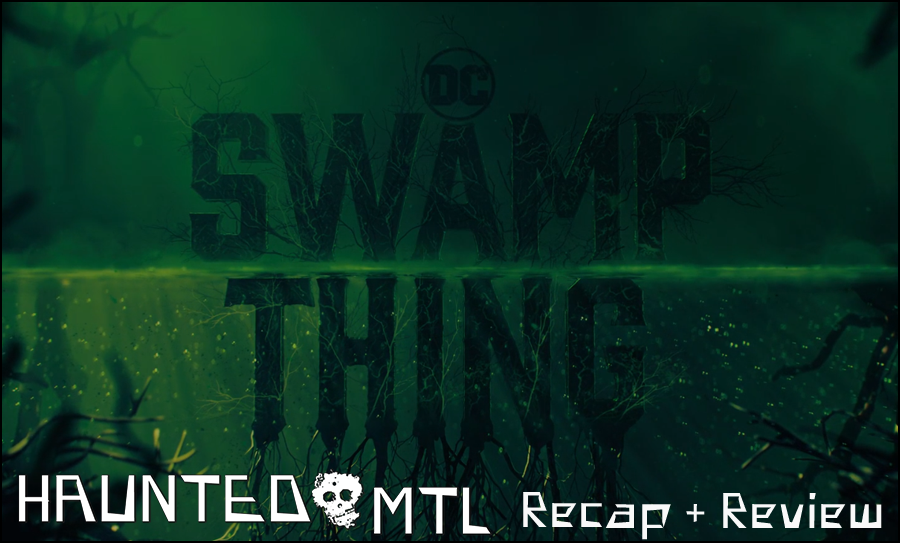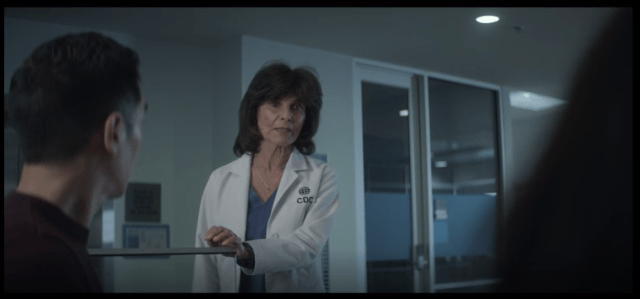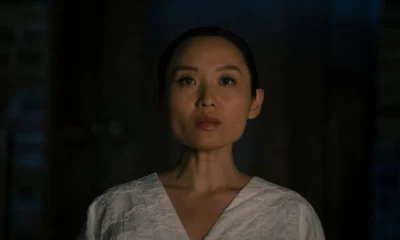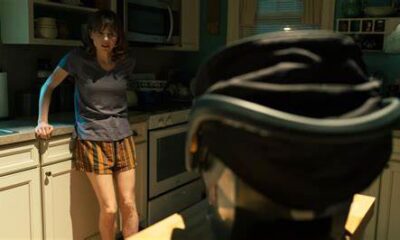
HMTL Recap and Review -Swamp Thing: S1E8 – “Long Walk Home”
Welcome back to Haunted MTL’s extensive recap and review series for Swamp Thing on DC Universe. Everyone seems to be in a key position now for the final two episodes in what has been a rather thrilling and satisfying season of horror television.
The Story So Far
Avery’s Swamp Trek

Having nearly been murdered by the sheriff and her son, Avery finds himself wounded and alone in the swamps of Marais. Avery has been in a character who, while maybe not entirely in control throughout the season, has had the air of someone who could get out of any setbacks. “Long Walk Home,” however, finds the industrialist at his most vulnerable. Delirious, Avery’s walk is punctuated with visions that flesh out his own relationship to the swamps; chiefly the murder of his father by the swamp itself. In a flashback, Avery watches his father dragged into a campfire by a tree that Sunderland, Sr. attempted to chop down.
It’s then that Avery is found by Swamp Thing. After being cared for, Avery offers to seek out a cure for Swamp Thing and meets with Jason Woodrue. Woodrue fills Avery in on the meeting with The Conclave that was taken over by Maria. The pair discuss the scientific advancements that could result from the study from the Swamp Thing, and Avery Sunderland gives in to his baser instincts, opting to capture the former Alec Holland for research purposes.
The CDC

Abby, after her long talk with Alec last episode, returns to the CDC in Atlanta to continue her work, eager to help Alec in any way she can. Things are off, however, in that Abby is being received coldly by the powers that be and the samples she sent for analysis are being withheld from her. Abby encounters Dr. Palomar (Adrienne Barbeau) her new boss, who informs her that things will be much different from here on out. Abby is able to reconnect with her CDC-pal Harlan, but by the end of the episode, his fate is likely up in the air. Abby also gets the pleasure of being introduced to The Conclave’s Nathan Ellery who reveals how much he knows about the situation in Marais. Cornered by The Conclave, Abby flees back to Marais to warn Swamp Thing of what is coming.
“Curse your sudden but inevitable betrayal!”

Swamp Thing rescues and cares for a delirious Avery Sunderland and introduces himself as the former Alec Holland. Avery, as expected, does not let on to how involved he was in Alec’s death. The pair have a deep discussion on the swamp and recent incidents. Swamp Thing hints at the nature of the rot in the swamp to Avery, suggesting that his own form, as the Swamp Thing, maybe the result of the Green fighting back. Avery, thankful to his swampy savior, offers to find a cure, which Swamp Thing does not outright dismiss.
Avery Sunderland and Jason Woodrue later enter the swamp, seeking out Swamp Thing. This is a trap, however, as The Conclave has provided a team to take down the creature of the swamp. They manage, using liquid nitrogen, to contain the Swamp Thing, ready to be carted off to a lab for Woodrue to begin his research.
What Stood Out?
The cinematography of Avery’s trek through the swamp was quite well done. The shots really added to the sense of delirium and exhaustion felt by the character, and the Swamp Thing’s reveal to Sunderland is handled quite effectively.
The Final Verdict on Swamp Thing
“Long Walk Home” is a strong episode that distills the three main figures of the show to what seems to be their essential, core struggles; Avery grapples with his past and ambition, ultimately repaying the kindness of his savior with what is sure to be inevitable torture. Abby Arcane, again finding herself torn between her professional world of the CDC and the mystical high-strangeness of the swamps ultimately chooses the Swamp Thing. The Swamp Thing himself, a tortured soul, finds his efforts to reconnect to the world of man exploited because of what he is. It’s all a very strong set up to the final pair of episodes in the first and the only season of Swamp Thing.
 (4 / 5)
(4 / 5)
Deep Roots
The Conclave is a deep, deep organization in the comics, and their presence in the CDC should not come as a surprise to viewers as it is meant to establish that they have a wide base of power from which to draw.
Dr. Palomar, the CDC director who Abby clashes with, should be recognizable to any fan of Swamp Thing and horror in general: Adrienne Barbeau. Barbeau’s history in horror is worthy of an article in itself, but for our purposes, we’ll highlight her role as Alice Cable in Wes Craven’s 1982 adaptation of Swamp Thing. As with any adaptation there were changes between the source material and the adaptation, but Alice Cable is very much an adaptation of the Abby Arcane character.
Movies n TV
Wheel of Time A Question of Crimson Is a Political Espionage Delight
Episode two of Wheel of Time felt like the beginning of a long journey. Stories are unfolding, lives are changing, and blood is spilling.
Let’s discuss.
The story
We begin this episode in the past with Elayne’s mother, Queen Morgase. It turns out her rise to the throne was a bit, shall we say, cutthroat. So when she shows up at the White Tower, Siuan is concerned.
She might have reason to be, too.
Meanwhile, Rand, Egwene, Moiraine, Lan and Aviendha are in the Spine of The World. As they travel through some of the most breathtaking lands I have ever seen on a TV show, Egwene is plagued with nightmares. We think at first that’s just her trauma working itself through her system. But we soon find out that it might not be that straightforward.
Finally, Perrin returns home to heal after his hand is almost cut in half. But when he gets there he finds the town has been infested by Children of The Light. And they’re looking for him.
What worked
There was something heartwarming in this episode about political espionage and choking religious persecution. And that is Elayne’s relationship with her family.
I have consumed a lot of fantasy content with royal families. And I have never once heard a princess call her mother ‘Mum’. I’ve never seen royal siblings get along. And I have sure as hell never seen a princess have a good relationship with her step-parent.
This was refreshing. Even though Queen Morgase is kind of a horrible person she seems like a good mother. And that’s an unexpected delight.

Of course, this is just one storyline among many. And while this can sometimes be overwhelming, in this case it wasn’t.
I’ll be honest, some of these storylines are going to drag for me. I know this because I’ve read some of the Wheel of Time books and I have an idea that not all the characters exactly pique my interest.
No one likes all the characters. No one likes all the storylines. While I am here for the political espionage between Queen Morgase and Siuan, not everyone likes it. While others might be fascinated with Selene trying to win Rand back, I couldn’t care less.
Having multiple storylines keeps everyone’s attention better. So long as things don’t get out of hand. Things can easily get out of hand. But this seems to be managed well.
So far.
What didn’t work
As I mentioned above, I’m not thrilled with Rand’s story at this point. And while it’s fine to not like a storyline when there are this many to choose from, it’s not fantastic that the one I like the least is the one involving our two main characters. And anytime we were with the team at the Spine of The World, the only thing that brought me joy was Moirain’s hat. It reminded me of Stockard Channing’s hat in Practical Magic.
The problem is that Rand is Charlie Brown with controversial magical powers. He is boring, serious, and pessimistic.
And yes, I understand that he has a heavy emotional burden and he’s the Dragon Reborn and that’s quite taxing and all. But let’s be fair, there isn’t a single person in this show that doesn’t have a heavy burden. And most of them manage to be fun occasionally.

All that being said, this episode of Wheel of Time did exactly what it needed to do. It set up conflicts at each of the three locations. It established emotional ties between the characters and the events. And it established goals for everyone.
This was, in short, a solid episode. Not groundbreaking, not mind-blowing or life changing. It was simply good. It was entertaining and moved the plot forward.
Well done.
 (3.5 / 5)
(3.5 / 5)
Movies n TV
Wheel of Time Returns With A Bang
Wheel of Time is back for season three. There are mixed feelings regarding this. Last season, there were some serious pacing issues. And some serious sticking to the book’s storyline issues. But we’re two seasons in, and we don’t give up so easily. So let’s dive into episode one, To Race the Shadow.
By the way, I highly recommend watching this episode with the subtitles on. You’ll see why.
The story
We begin this episode with Liandrin facing a trial of sorts for her rampant betrayal. She does her best to gaslight her Aes Sedai sisters into thinking that Siuan Sanche is the real traitor.

When that doesn’t work, she reveals how many Black Aes Sedai have actually infiltrated the tower.
Spoiler, it’s a lot.
In the aftermath, our whole team gathers to drink and enjoy one night of relaxation before they head out to the Tear to form an army for Rand. All is going well until they’re attacked by myriad creatures and a sentient axe.
What worked
This episode was long. It had a run time of an hour and eleven minutes. And a lot of that run time was spent in heavy dialog scenes.
Fortunately, these were well-done scenes.
If you’re going to have a lot of talking scenes, there are good ways and bad ways to do it. Last season, we saw lots of examples of the bad way to do it. But this episode did it well. For one thing, other things were going on while conversations were taking place. The characters are drinking, playing games, walking through an interesting city. And the scenes themselves didn’t stretch out. They weren’t repetitive. We heard what the character had to say, then we moved on.
It was also nice that the point of these scenes wasn’t just info dumps. We had character development. We had romantic interactions. We had plot development and foreshadowing.
Overall, this episode felt like what it was. A moment of calm before a storm.
Taking a step back, I’d be remiss if I didn’t address the fight scene at the start of the episode. Because it was epic.
The magic looked amazing. The martial arts that went along with it looked fantastic. The costumes were beautiful. It was just incredibly fun to watch.
More than that, it was emotional. We lost some characters in that fight that were important. And it was clearly emotionally shattering for many of our characters, who found themselves betrayed by people they trusted.
So many of them.
It was a great way to open the season.
What didn’t work
Despite that, this episode wasn’t without its flaws.
First off, there were a lot of dialog scenes. And they were good scenes, as I’ve already discussed. But it was one after another after another. And when your episode is, again, an hour and eleven minutes, it’s maybe a little much to have so much chit-chat. Couldn’t some of these conversations, important as they were, have been moved to maybe another episode?
Finally, I want to talk about Egwene’s travel through the arches.

I feel like maybe there were some deleted scenes here. Because there must have been more to that visit than what we saw, right?
We could have seen Egwene battle Rand. That would have been badass and emotionally devastating. We could have seen her with a quiet life with Rand back home at the Two Rivers. We could have seen anything except for the quick clip of Rand in a bloody river, followed by Egwene being shoved back out in a bloody shift.
No products found.
Bad job. But at least it wasn’t an extended scene of Moiraine collecting bathwater, and then taking a bath while looking sad. If we’d started this season with another scene like that, it might have broken my brain.
Amazon dropped the first three episodes at once. So we’ll be back soon to talk about episode two. See you then.
 (4 / 5)
(4 / 5)
Movies n TV
Entertaining as hell: Eight Legged Freaks (2002) Review
Early 2000s is a special era for the industry. It accepts the cheesiness and corniness of movie making, in turn producing some gems in their own right. Eight Legged Freaks starring David Arquette and young Scarlet Johanson is a horror comedy about giant spiders who overtake a small town. As crazy as that premise sounds, the movie surprisingly has a ton of heart and is super entertaining. Let’s review, shall we?
Plot
We start Eight Legged Freaks with a shot of toxic waste spilling into the water supply of Joshua, a spider farm owner. He is friends with Mike, one of our protagonists, who is a science geek and a spider enthusiast. Mike notices something quite right upon visiting Joshua, but no one takes him seriously. We are then introduced to the rest of the crew. Mike’s mother Samantha, the town sheriff, is too busy chasing Ashley, his sister, who is dating the town mayor’s son Bret (something Samantha does not approve of). We also have Chris, who returns to the town to save his father’s legacy in the town mines. He has opposition from Wade, Bret’s father, who wants to use the mines for his business ventures. Lots of drama going on that will only get juicier once the spiders get loose.
The creepy crawlies quickly dispose of Joshua and make their grand appearance after Ashley rejects Bret’s advances, abandoning him in the middle of a desert. A glorious chase sequence ensues as the spiders make their way towards the town, wreaking havoc on its residents. In a true horror fashion (which the movie acknowledges), it takes some convincing from Mike and then from Samantha for the town to take the threat seriously. The tongue-in-cheek style of narrative adds the comedy aspect to a movie that would otherwise burn out fairly quickly.
The remaining characters hide out in a shopping mall as it’s the only somewhat sturdy building in the area. This doesn’t last long as the spiders break in, forcing them to run through the mines. Their resources to fight the creepy crawlies off are limited as the methane gas doesn’t allow them to use firearms. Such conditions require resourceful thinking from Chris, who uses perfume to fend off the leader of the spider group and save himself during the climax of the movie.
Character dynamics are not forgotten once the action kicks in. We have Chris confessing his long-term feelings for Samantha which she knew all along, which provided some comedic relief. Bret also reunites with Ashley and apologises for being an asshole. Mike finally gets the appreciation he deserves as his knowledge saves the townsfolk more than once during the whole ordeal.
We end the movie with the town’s radio show person telling the story as an urban legend during his segment. This brings it into question – how much of it happened the way he said it did? We can only guess…
Overall thoughts
Eight Legged Freaks is a fun creature feature with some self-aware commentary on genre tropes that doesn’t take itself too seriously. The acting is good, the pacing fitting and the characters are likeable enough for you to want them to make it through. Definitely a must watch, if you don’t suffer from arachnophobia, that is.
 (5 / 5)
(5 / 5)
- What do you get when you cross toxic waste with a bunch of exotic spiders? Eaten! The townies of Prosperity, Arizona will all become a screaming smorgasbord if mutated arachnids as big as SUVs have their way in this comedy/horror crowd pleaser whose creators include the producers of Independence Day and Godzilla
- Spiders that leap like gazelles, web-spitting spiders, spiders that suck your insides out as if through a straw—they’re all among the behemoths conjured up by an inventive effects team
- David Arquette (Scream) leads the two-legged stars, mobilizing the citizenry in a last-ditch fight to survive
Last update on 2025-03-10 / Affiliate links / Images from Amazon Product Advertising API













